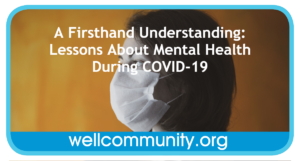 May is Mental Health Awareness month. We want to help you become more informed, not only about severe mental illnesses faced by our members, but also about how the stresses of COVID-19 can impact your mental health and what you can do about it.
May is Mental Health Awareness month. We want to help you become more informed, not only about severe mental illnesses faced by our members, but also about how the stresses of COVID-19 can impact your mental health and what you can do about it.
While the mental health ramifications of COVID-19 make this pandemic a crisis in and of themselves, there is a benefit hidden within this monumental challenge: Our society as a whole is becoming more aware of mental health on a personal level and more open to talking about it. As a growing number of people wrestle with their mental health—some for the first time—our culture is gaining understanding of what those living with mental illnesses face day after day, year after year. Below are key lessons that will help shape the future of the conversation around mental health for the better.
Gaining Firsthand Awareness
None of us are immune to mental health challenges. Thanks to the many who’ve spoken out about these struggles in recent years, our culture has a much greater awareness of this fact than it did a decade ago. But, until the past couple months, many of us didn’t have a firsthand understanding that any of us can affected.
A late April 2020 study by the nonpartisan and objective research organization NORC at the University of Chicago found that over 40% of Americans had felt hopeless in the past week. Many are experiencing prolonged anxiety or depression, while those who were already living with mental health struggles, such as the members of The Well Community, are facing additional hurdles. And, very few of us have made it this far into the pandemic without seeing our mental health impacted for the worse in some way.
But, as many of us navigate what was once unfamiliar territory, we’re gaining true awareness of mental health struggles and of the reality that all of us are vulnerable. And, as we talk about our experiences, we’re not only growing our own understanding, but helping our culture better comprehend these challenges and see them not as causes for shame but as common hurdles than can—and should—be openly discussed.
Understanding the Effects of Isolation
Unlike people dealing with severe mental illnesses, many Americans had never experienced a prolonged absence of social contact—until the virus hit. But, as shelter-at-home precautions have caused us to stay separated from friends and extended family and prevented us from going to work or school, we’re learning how being isolated from others deeply impacts wellbeing.
Gallup reports that Americans believe that the isolation of the coronavirus will cause their mental health to suffer first. While over two-thirds of respondents to a recent poll said they could continue to follow social distancing guidelines for as long as necessary before their physical health suffered, just 48% said they could do the same before they saw their mental wellbeing decline. And, more than twice as many people said their mental health was already suffering as compared to those who responded that their physical health had taken a hit.
As we experience the glaring absence of birthday parties, of working and worshipping together and even of sharing smiles with strangers at the grocery store, we’re gaining an understanding of the reality that those living with serious mental illnesses already faced before the pandemic hit. Members of The Well Community are often met with avoidance, unkindness and stigma. The impact of this ongoing isolation multiples their challenges of managing their mental health conditions.
Sensing the Need for Community
The other side of the coin of understanding the impact of isolation is grasping our deep need for community. Social distancing affects us so profoundly because it deprives us of connections and community; and when we’re deprived of these benefits, we get a taste of what it’s like for those who suffer from life-altering mental health challenges—people who typically struggle to find accepting circles of support.
In times of crisis, finding community is even more difficult for individuals living with mental illnesses. But, amid the great challenges of social distancing, The Well Community is able to offer lifelines of connection. As we provide nutritious and filling to-go lunches and essential hygiene supplies to our members, our staff give vital support, helping members continue to pursue mental health stability, even in uncertain times.
Selected COVID-19 Mental Health Resources
Curated Resource Lists
The National Alliance on Mental Health’s COVID-19 Resource and Information Guide
Mental Health America of Greater Dallas’ Resources for COVID-19
The National Institute on Mental Health’s Sharable Resources on Coping With COVID-19
The Hogg Foundation for Mental Health’s Resources for Mental Health and COVID-19
Social Work License Map’s Mental Health Resources to Support First Responders
Support Lines
North Texas Behavioral Authority COVID-19 Mental Health Support Line
Metrocare’s Coronavirus Support Line
